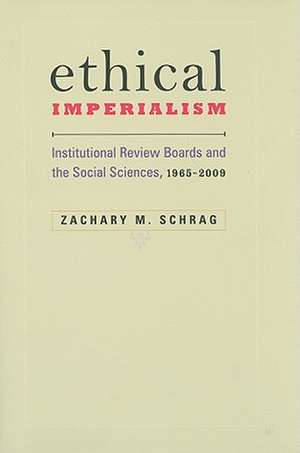Ethical Imperialism – Institutional Review Boards and the Social Sciences, 1965–2009
Autor Zachary M. Schragen Limba Engleză Hardback – 16 sep 2010
University researchers in the United States seeking to observe, survey, or interview people are required first to complete ethical training courses and to submit their proposals to an institutional review board (IRB). Under current rules, IRBs have the power to deny funding, degrees, or promotion if their recommended modifications to scholars' proposals are not followed. This volume explains how this system of regulation arose and discusses its chilling effects on research in the social sciences and humanities.
Zachary M. Schrag draws on original research and interviews with the key shapers of the institutional review board regime to raise important points about the effect of the IRB process on scholarship. He explores the origins and the application of these regulations and analyzes how the rules--initially crafted to protect the health and privacy of the human subjects of medical experiments--can limit even casual scholarly interactions such as a humanist interviewing a poet about his or her writing. In assessing the issue, Schrag argues that biomedical researchers and bioethicists repeatedly excluded social scientists from rule making and ignored the existing ethical traditions in nonmedical fields. Ultimately, he contends, IRBs not only threaten to polarize medical and social scientists, they also create an atmosphere wherein certain types of academics can impede and even silence others.
The first work to document the troubled emergence of today's system of regulating scholarly research, Ethical Imperialism illuminates the problems caused by simple, universal rule making in academic and professional research. This short, smart analysis will engage scholars across academia.
Preț: 376.91 lei
Nou
Puncte Express: 565
Preț estimativ în valută:
72.12€ • 75.49$ • 60.03£
72.12€ • 75.49$ • 60.03£
Carte tipărită la comandă
Livrare economică 31 martie-14 aprilie
Preluare comenzi: 021 569.72.76
Specificații
ISBN-13: 9780801894909
ISBN-10: 0801894905
Pagini: 264
Dimensiuni: 161 x 230 x 22 mm
Greutate: 0.5 kg
Editura: Johns Hopkins University Press
ISBN-10: 0801894905
Pagini: 264
Dimensiuni: 161 x 230 x 22 mm
Greutate: 0.5 kg
Editura: Johns Hopkins University Press
Textul de pe ultima copertă
University researchers in the United States seeking to observe, survey, or interview people are required first to complete ethical training courses and to submit their proposals to an institutional review board (IRB). Under current rules, IRBs have the power to deny funding, degrees, or promotion if their recommended modifications to scholars' proposals are not followed. This volume explains how this system of regulation arose and discusses its chilling effects on research in the social sciences and humanities.
Zachary M. Schrag draws on original research and interviews with the key shapers of the institutional review board regime to raise important points about the effect of the IRB process on scholarship. He explores the origins and the application of these regulations and analyzes how the rules--initially crafted to protect the health and privacy of the human subjects of medical experiments--can limit even casual scholarly interactions such as a humanist interviewing a poet about his or her writing. In assessing the issue, Schrag argues that biomedical researchers and bioethicists repeatedly excluded social scientists from rule making and ignored the existing ethical traditions in nonmedical fields. Ultimately, he contends, IRBs not only threaten to polarize medical and social scientists, they also create an atmosphere wherein certain types of academics can impede and even silence others.
The first work to document the troubled emergence of today's system of regulating scholarly research, Ethical Imperialism illuminates the problems caused by simple, universal rule making in academic and professional research. This short, smart analysis will engage scholars across academia.
"Ethical Imperialism is a remarkable accomplishment and a must-read for researchers and policy makers. It persuasively weaves together the scholarly, disciplinary, regulatory, and bureaucratic strands that account for today's 'omnipresent threat' to social research."--Canadian Journal of Sociology
"This book ought to be required reading for those concerned about the political forces that make our work possible, and sometimes not possible at all."--American Historical Review
"[A]n impressive assessment of IRBs, from their tenuous beginnings in the early 1960s as a practical response to a perceived threat to the public from medical research to [their] present status as a threat to academic freedom in the social sciences... [A] significant contribution to those oral historians and related practitioners who would seek to challenge IRB's right and ability to adequately evaluate their research projects, particularly before the research has been conducted."--Oral History Review
"A valuable contribution to the history of federal science policy and a useful critique of a system ill-suited to the uses to which it is being put."--Journal of American History
Zachary M. Schrag draws on original research and interviews with the key shapers of the institutional review board regime to raise important points about the effect of the IRB process on scholarship. He explores the origins and the application of these regulations and analyzes how the rules--initially crafted to protect the health and privacy of the human subjects of medical experiments--can limit even casual scholarly interactions such as a humanist interviewing a poet about his or her writing. In assessing the issue, Schrag argues that biomedical researchers and bioethicists repeatedly excluded social scientists from rule making and ignored the existing ethical traditions in nonmedical fields. Ultimately, he contends, IRBs not only threaten to polarize medical and social scientists, they also create an atmosphere wherein certain types of academics can impede and even silence others.
The first work to document the troubled emergence of today's system of regulating scholarly research, Ethical Imperialism illuminates the problems caused by simple, universal rule making in academic and professional research. This short, smart analysis will engage scholars across academia.
"Ethical Imperialism is a remarkable accomplishment and a must-read for researchers and policy makers. It persuasively weaves together the scholarly, disciplinary, regulatory, and bureaucratic strands that account for today's 'omnipresent threat' to social research."--Canadian Journal of Sociology
"This book ought to be required reading for those concerned about the political forces that make our work possible, and sometimes not possible at all."--American Historical Review
"[A]n impressive assessment of IRBs, from their tenuous beginnings in the early 1960s as a practical response to a perceived threat to the public from medical research to [their] present status as a threat to academic freedom in the social sciences... [A] significant contribution to those oral historians and related practitioners who would seek to challenge IRB's right and ability to adequately evaluate their research projects, particularly before the research has been conducted."--Oral History Review
"A valuable contribution to the history of federal science policy and a useful critique of a system ill-suited to the uses to which it is being put."--Journal of American History
Notă biografică
Zachary M. Schrag is a professor of history at George Mason University.
Descriere
This short, smart analysis will engage scholars across academia.




